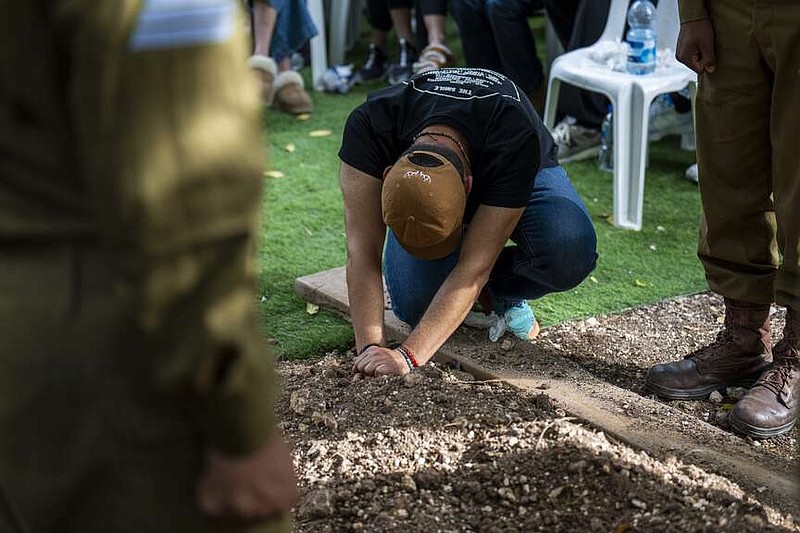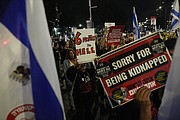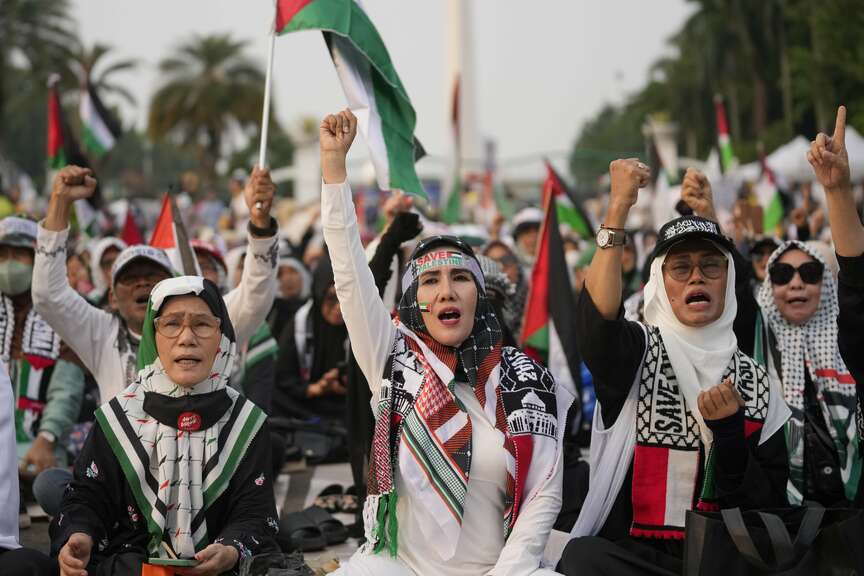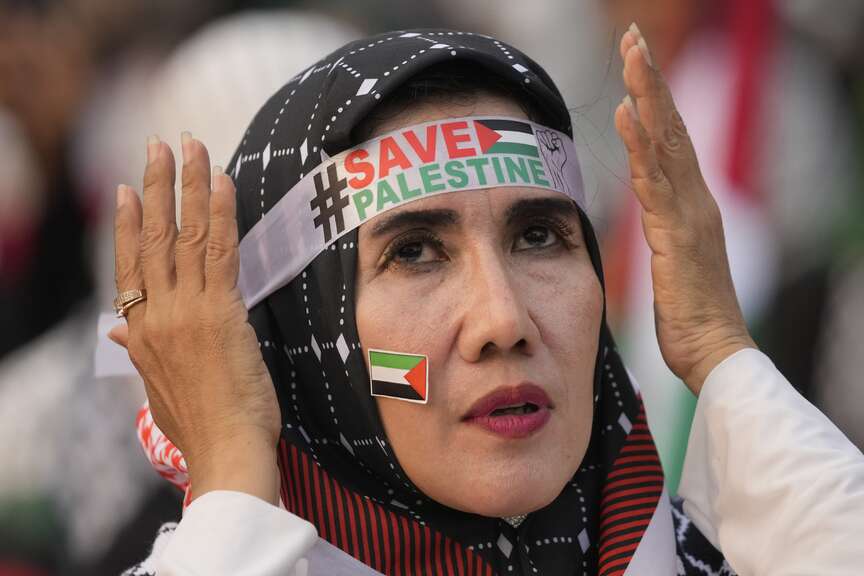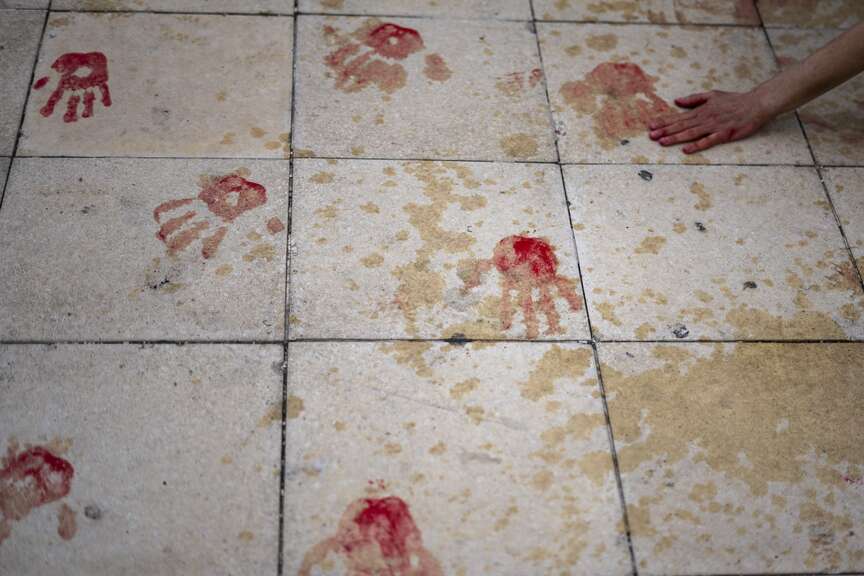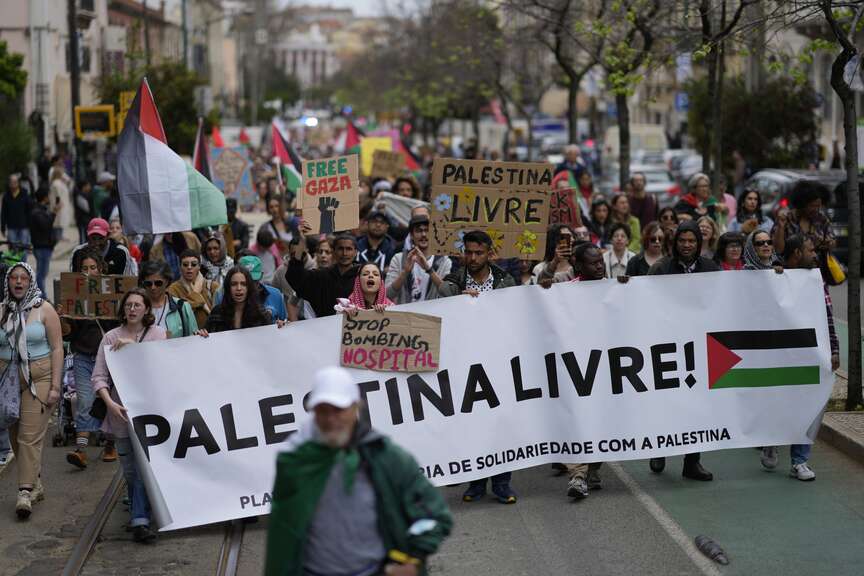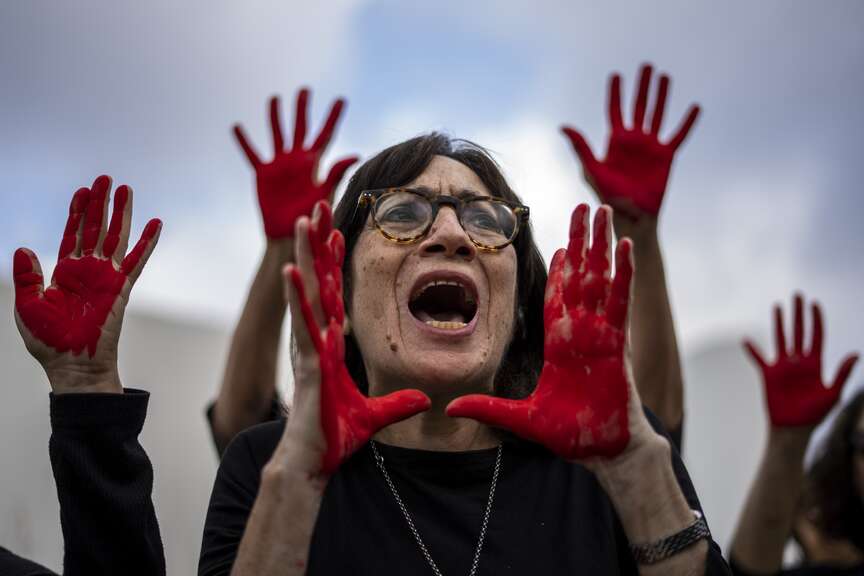JERUSALEM -- Israel's military announced Sunday it had withdrawn its forces from the southern Gaza city of Khan Younis, wrapping up a key phase in its ground offensive against the Hamas militant group and bringing its troop presence in the territory to one of the lowest levels since the six-month war began.
But defense officials said troops were merely regrouping as the army prepares to move into Hamas' last stronghold, Rafah. "The war in Gaza continues, and we are far from stopping," said the military chief, Lt. Gen. Herzi Halevi.
Local broadcaster Channel 13 TV reported that Israel was preparing to begin evacuating Rafah within one week and the process could take several months.
Still, the withdrawal was a milestone as Israel and Hamas marked six months of fighting. Military officials, speaking on condition of anonymity under army policy, said a "significant force" remained in Gaza to continue targeted operations including in Khan Younis, hometown of the Hamas leader, Yehya Sinwar.
Associated Press video in Khan Younis showed some people returning to a landscape marked by shattered multistory buildings and climbing over debris. Cars were overturned and charred. Southern Gaza's main hospital, Nasser, was in shambles.
"It's all just rubble," a dejected Ahmad Abu al-Rish said. "Animals can't live here, so how is a human supposed to?"
Israel for weeks has vowed a ground offensive in nearby Rafah. But the city shelters some 1.4 million people -- more than half of Gaza's population. The prospect of an offensive has raised global alarm, including from Israel's top ally, the U.S., which has demanded to see a credible plan to protect civilians. Allowing people to return to nearby Khan Younis could relieve some pressure on Rafah.
White House national security spokesperson John Kirby repeated on Sunday the U.S. opposition to a Rafah offensive and told ABC the U.S. believes that the partial Israeli withdrawal "is really just about rest and refit for these troops that have been on the ground for four months and not necessarily, that we can tell, indicative of some coming new operation for these troops."
Israel's military quietly drew down troops in devastated northern Gaza earlier in the war. But it has continued to carry out airstrikes and raids in areas where it says Hamas has resurfaced, including Gaza's largest hospital, Shifa, leaving what the head of the World Health Organization called "an empty shell."
FRUSTRATION IN ISRAEL
The six-month mark has been met with growing frustration in Israel, where anti-government protests have swelled and anger is mounting over what some see as government inaction to help free about 130 remaining hostages, about a quarter of whom Israel says are dead. Hamas-led militants took about 250 captives when they crossed from Gaza into Israel on Oct. 7 and killed 1,200 people, mostly civilians.
Several thousand protesters called for a "hostage deal now" at a rally outside the Knesset in Jerusalem, organized by hostages' families. In southern Israel, weeping relatives gathered at the site of a music festival where more than 300 people were killed on Oct. 7.
"It's an impossible reality for us, it's an impossible reality for the Gazans and the people of this country. We just want to live," said one protester, Talia Ezrahi.
"I would agree to anything to return the hostages and stop the mass killings in Gaza," said another protester, Michal Fruchtman.
Negotiations in pursuit of a cease-fire in exchange for the hostages' release were expected to resume in Cairo on Sunday. An Israeli delegation led by the head of the Mossad intelligence agency was going to Cairo, according to an Israeli official who spoke on condition of anonymity because they were not authorized to discuss the matter with the media.
Pressure rose for action now.
"This doesn't seem a war against terror. This doesn't seem anymore a war about defending Israel. This really, at this point, seems it's a war against humanity itself," chef José Andrés told ABC, days after an Israeli airstrike killed seven of his World Central Kitchen colleagues in Gaza. Aid deliveries on a crucial new sea route to the territory were suspended.
"Humanity has been all but abandoned" in Gaza, the International Federation of Red Cross and Red Crescent Societies said in a statement.
The U.N. and partners now warn of "imminent famine" for more than 1 million people in Gaza as humanitarian workers urge Israel to loosen restrictions on the delivery of aid overland, the only way to meet soaring needs as some Palestinians forage for weeds to eat. Thousands of aid trucks have been waiting to enter Gaza.
"It's a slow-motion massacre of people to subject them to the kind of deprivation of food and water that they have been subjected to for the last six months," Doctors Without Borders USA executive director Avril Benoit told CBS.
Mothers who have given birth in Gaza since the war began are especially vulnerable.
The Health Ministry in Gaza said the bodies of 38 people killed in Israel's bombardment had been brought to the territory's remaining functional hospitals in the past 24 hours. It said 33,175 have been killed since the war began. It doesn't differentiate between civilians and combatants but says two-thirds of the dead are children and women.
Israel's military continued to suffer losses, including in Khan Younis, where the military said four soldiers were killed. Over 600 Israeli soldiers have been killed since Oct. 7, according to Israel's government.
Concerns about a wider regional conflict continued as a top Iranian military adviser warned Israel that none of its embassies were safe following last week's strike in Damascus -- blamed on Israel -- that killed two elite Iranian generals and flattened an Iranian consular building. Israel has not directly acknowledged its involvement.
"None of the embassies of the (Israeli) regime are safe anymore," Gen. Rahim Safavi, a military adviser to Iran's supreme leader Ayatollah Ali Khamenei, was quoted as saying by the semi-official Tasnim agency.
U.N. PRELIMINARY HEARINGS
Preliminary hearings open today at the United Nations' top court in a case that seeks an end to German military and other aid to Israel, based on claims that Berlin is "facilitating" acts of genocide and breaches of international law in the Israel-Hamas war in Gaza.
Israel strongly denies its military campaign amounts to breaches of the Genocide Convention.
While the case brought by Nicaragua centers on Germany, it indirectly takes aim at Israel's military campaign in Gaza.
"We are calm and we will set out our legal position in court," German Foreign Ministry spokesperson Sebastian Fischer said ahead of the hearings.
"We reject Nicaragua's accusations," Fischer told reporters in Berlin on Friday. "Germany has breached neither the genocide convention nor international humanitarian law, and we will set this out in detail before the International Court of Justice."
Nicaragua has asked the court to hand down preliminary orders known as provisional measures, including that Germany "immediately suspend its aid to Israel, in particular its military assistance including military equipment in so far as this aid may be used in the violation of the Genocide Convention" and international law.
The court will likely take weeks to deliver its preliminary decision, and Nicaragua's case will probably drag on for years.
On Friday, the U.N.'s top human rights body called on countries to stop selling or shipping weapons to Israel. The United States and Germany opposed the resolution.
Also, hundreds of British jurists, including three retired Supreme Court judges, have called on their government to suspend arms sales to Israel after three U.K. citizens were among the seven aid workers from World Central Kitchen killed in Israeli strikes.
Germany has for decades been a staunch supporter of Israel. Days after the Oct. 7 attack by Hamas, Chancellor Olaf Scholz explained why. "Our own history, our responsibility arising from the Holocaust, makes it a perpetual task for us to stand up for the security of the state of Israel," he told lawmakers.
Berlin, however, has gradually shifted its tone as civilian casualties in Gaza have soared, becoming increasingly critical of the humanitarian situation in Gaza, and has spoken out against a ground offensive in Rafah.
Nicaragua's government, which has historical links with Palestinian organizations dating back to their support for the 1979 Sandinista revolution, was itself accused earlier this year by U.N.-backed human rights experts of systematic human rights abuses "tantamount to crimes against humanity." The government of President Daniel Ortega fiercely rejected the allegations.
Nicaragua argues that by giving Israel political, financial and military support and by defunding the United Nations aid agency for Palestinians, UNRWA, "Germany is facilitating the commission of genocide and, in any case, has failed in its obligation to do everything possible to prevent the commission of genocide."
Israel strongly denies that its assault amounts to genocidal acts, saying it is acting in self-defense. Israeli legal adviser Tal Becker told judges at the court in January that the country is fighting a "war it did not start and did not want."
Information for this article was contributed by Jack Jeffery, Tia Goldenberg, Mike Corder, Pamela Sampson, Natalie Melzer, Kareem Chehayeb and Geir Moulson of The Associated Press.
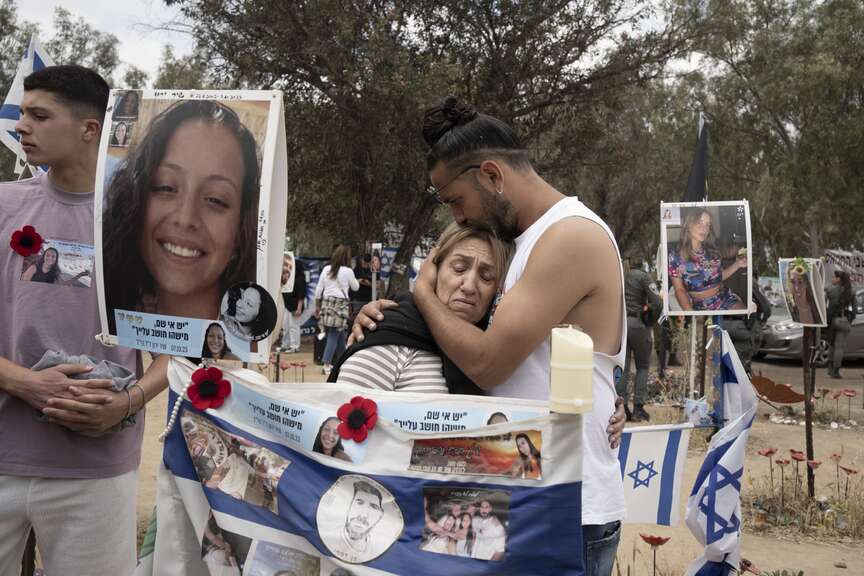 Relatives of a young woman killed in a cross-border attack by Hamas that killed or kidnapped hundreds of revelers at the Nova music festival comfort each other at the site in Re'im, southern Israel, Sunday, April 7, 2024, on the sixth month anniversary of the Oct. 7, 2023 attack. (AP Photo/Maya Alleruzzo)
Relatives of a young woman killed in a cross-border attack by Hamas that killed or kidnapped hundreds of revelers at the Nova music festival comfort each other at the site in Re'im, southern Israel, Sunday, April 7, 2024, on the sixth month anniversary of the Oct. 7, 2023 attack. (AP Photo/Maya Alleruzzo)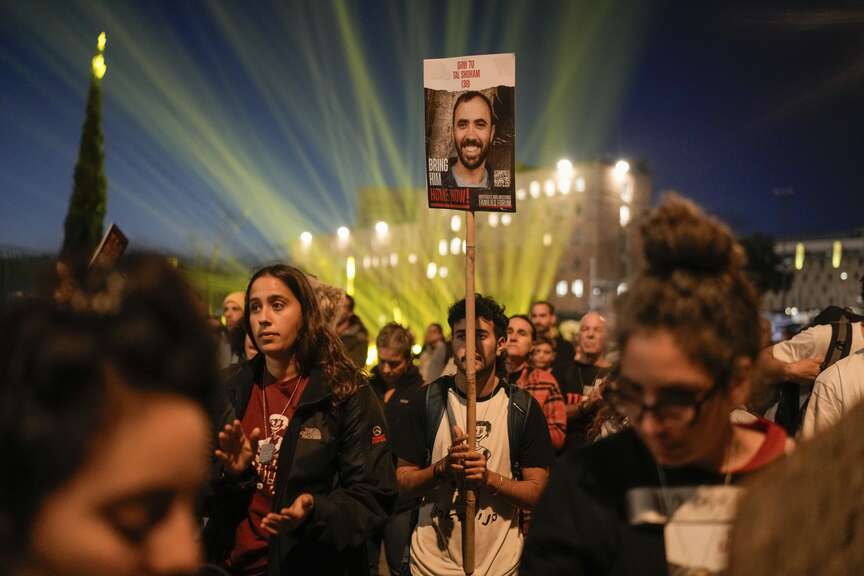 Israeli demonstrators call on the government to secure the release of hostages held in the Gaza Strip by Hamas during a rally marking six months since the outbreak of war against the Islamic militant group, outside the Knesset, Israel's parliament, in Jerusalem, Sunday, April 7, 2024. (AP Photo/Leo Correa)
Israeli demonstrators call on the government to secure the release of hostages held in the Gaza Strip by Hamas during a rally marking six months since the outbreak of war against the Islamic militant group, outside the Knesset, Israel's parliament, in Jerusalem, Sunday, April 7, 2024. (AP Photo/Leo Correa)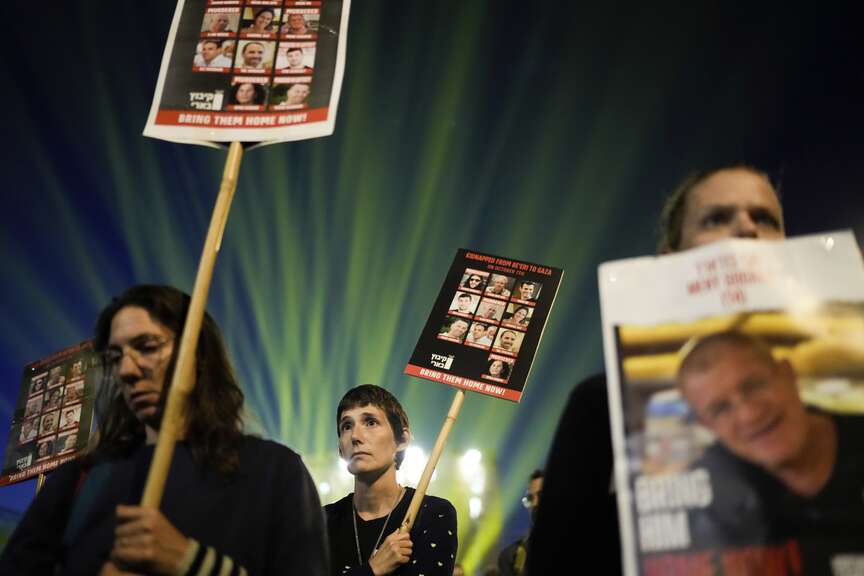 Israeli demonstrators call on the government to secure the release of hostages held in the Gaza Strip by Hamas during a rally marking six months since the outbreak of war against the Islamic militant group, outside the Knesset, Israel's parliament, in Jerusalem, Sunday, April 7, 2024. (AP Photo/Leo Correa)
Israeli demonstrators call on the government to secure the release of hostages held in the Gaza Strip by Hamas during a rally marking six months since the outbreak of war against the Islamic militant group, outside the Knesset, Israel's parliament, in Jerusalem, Sunday, April 7, 2024. (AP Photo/Leo Correa)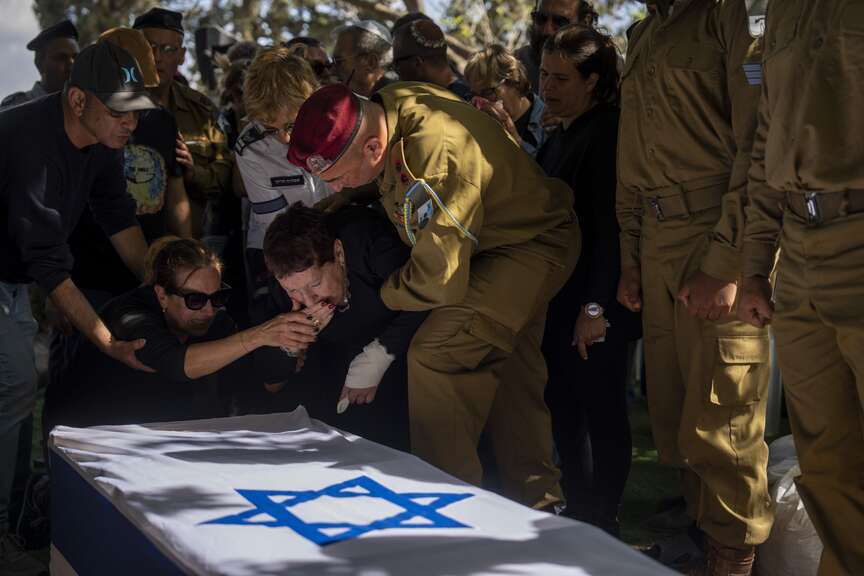 Family of Israeli solider Sergeant Reef Harush mourn in grief during his funeral in Ramat David, Israel, Sunday, April 7, 2024. Harush, 20, was killed during Israel's ground operation in the Gaza Strip, where the Israeli army has been battling Palestinian militants in the war ignited by Hamas' Oct. 7 attack into Israel. (AP Photo/Ariel Schalit)
Family of Israeli solider Sergeant Reef Harush mourn in grief during his funeral in Ramat David, Israel, Sunday, April 7, 2024. Harush, 20, was killed during Israel's ground operation in the Gaza Strip, where the Israeli army has been battling Palestinian militants in the war ignited by Hamas' Oct. 7 attack into Israel. (AP Photo/Ariel Schalit)
